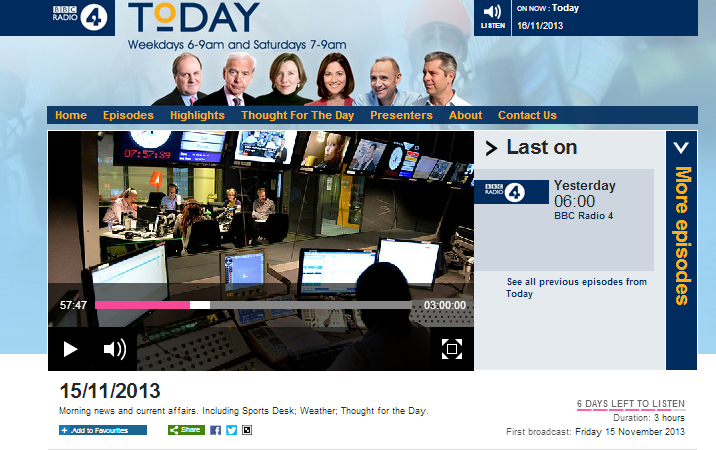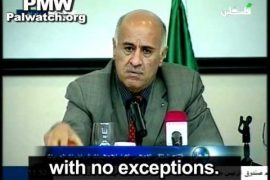As noted in the comments to a previous post and in numerous e-mails arriving in the BBC Watch inbox over the past 24 hours or so, on Friday November 15th 2013 the BBC Radio 4 ‘Today’ programme included an interview with Baroness Sayeeda Warsi on the subject of the persecution of Christians. The interview can be heard here for a limited period of time from 53:38.
The interview was conducted by presenter Sarah Montague. Below is a transcript.
SM: “Foreign Office minister Baroness Warsi has warned that Christians in some parts of the world face extinction because of violence against them. She says that it has become a global crisis and she’s giving a speech in Washington today about what should be done to address the problem. I spoke to her earlier.
Baroness Warsi: “I’m concerned, Sarah – as are members of the public from the large amount of correspondence that we receive – that the birthplace of Christianity – the parts of the world where Christianity first spread – is now seeing large sections of the Christian community leaving and that those that are remaining are feeling persecuted. And there are huge advantages to having pluralistic societies; everything from the economy to the way in which people develop educationally, and therefore we all have an interest in making sure that Christian communities do continue to feel like they belong and are not persecuted in the places where this religion was born.”
SM: “There have been a number of examples recently of churches and Christians being under attack. It’s particularly bad for Christianity, do you think?”
BW: “It is. I mean look; one in ten Christians live in a minority situation and large numbers of those who live in a minority situation around the world are persecuted and I think tragically what’s happening is that they are being seen as newcomers – being portrayed as ‘another’ within society, even though they have existed there for many, many centuries. And what we’re seeing, sadly, is a sense of collective punishment which is meted out by local groups, sometimes states, sometimes extremists. They’re seen as legitimate targets for what they perceive as actions of their co-religionists and this concept of collective punishment about them being seen as agents of maybe the West or other places around the world or agents of regimes is wrong and therefore we need to speak out and raise this with the countries where this is happening.
For example, I mean I have responsibility for Pakistan. One of the things we’ve been involved in is having very frank conversations with the prime minister there, with the foreign minister, with the minister who has responsibility for religious affairs, saying that politicians have a duty to speak out when this kind of persecution happens and to set the standard by which they expect societies to follow.”
SM: “But you’re talking about an area that is seeing a huge amount of upheaval at the moment. Beyond speaking out, one wonders what difference you can really make.”
BW: “There is much more that we can do. Look, there is an international consensus in the form of a Human Rights Council resolution on the treatment of minorities and tolerance towards other faiths, but we need to build political will behind that. Of course there have been moments when religious communities have been in conflict, but there have been great moments of co-existence between faiths and there isn’t an intrinsic clash between different faiths.”
SM: “But are you saying – can I just ask – countries like Pakistan that you refer to, or perhaps Israel or even Iraq where there is a functioning government – is it just down to the politicians in those countries to speak out and this problem could be solved?” [emphasis added]
BW: “Politicians need to set the standard. There was some interesting research that came out of the US which said that the way in which a community is treated after an incident – a minority community is treated after, say, an extremist incident – is very much dependent on the tone that politicians set and therefore politicians do have a responsibility to set the tone. They have a responsibility to mark out legal parameters as to what will and will not be tolerated. It’s a tragedy, Sarah, that eighty-three percent of countries have a constitution within which freedom of religion is defined as protected, but it’s not followed. We have articles – international articles – which are the most translated on freedom of religion, but they’re not implemented. So it’s not just about having laws; it’s about politicians having the political will to implement these laws.”
SM: “Baroness Warsi, thank you very much.”
Clearly, listeners would understand from Sarah Montague’s reference to Israel – alongside Pakistan and Iraq – that Christians are subject to persecution in that country too.
However, one listener at least received the following reply to a complaint made to the ‘Today’ programme:
“Thank you for your email. Sarah Montague cited Israel not as an example of a country which persecutes Christians but of a country where there is a functioning Government. She did this in the context of asking what responsibility politicians should bear for promoting harmony between those of different faiths.
There is evidence of an outflow of Christians from the Middle East caused in part by the unresolved dispute between Israel and the Palestinians but more widely by social, economic and political concerns. But Sarah’s question did not seek to apportion blame onto one single country or group of countries. It is clearly a more complicated issue than that.
I hope this helps answer your concerns.
Yours sincerely
Dominic Groves
Assistant Editor
‘Today’ “
Let’s examine that response more closely.
“Sarah Montague cited Israel not as an example of a country which persecutes Christians but of a country where there is a functioning Government. She did this in the context of asking what responsibility politicians should bear for promoting harmony between those of different faiths.”
No she did not. Sarah Montague lumped Israel together with Pakistan and Iraq and asked “is it just down to the politicians in those countries to speak out and this problem could be solved?” – thus clearly implying to listeners that similar problems of persecution of Christians exist in all three of the countries she named.
“There is evidence of an outflow of Christians from the Middle East caused in part by the unresolved dispute between Israel and the Palestinians but more widely by social, economic and political concerns.”
One would of course be very interested to see Mr Groves’ “evidence” of “an outflow of Christians from the Middle East caused in part by the unresolved dispute between Israel and the Palestinians”. In fact, as is well known and amply documented, Israel is the only country in the Middle East which has a growing Christian population. 
“In 1949 there were 38,000 Christians in Israel. By 2000 that number had risen to 130,000, by 2005 to 146,000 and one year ago, at the end of 2011, there were 154,500 Israeli Christians. Nazareth has 22,000 Christians among its population, Haifa […] around 14,000, and Shfaram around 9,300.
In 1947 there were 28,000 Christians living in Jerusalem. During the 19 years of Jordanian rule over the eastern part of the city, 61% of them left, with the population reduced to 11,000 when the city was reunited in the Six Day War. At the end of 2010, the Christian population of Jerusalem was 11,600.”
There is, of course, one aspect of this issue which the BBC is clearly intent on ignoring both in this interview and in other content it has produced.
“In 1947 the population of Bethlehem was 85% Christian. In 1990 23,000 Christians lived there, as a 60% majority. After the Palestinian Authority took over control of the town in 1995 the town’s municipal boundaries were altered to include concentrations of Muslim population, turning the Christians into a minority. By 2010 the number of Christians in Bethlehem had fallen to 7,500.
Journalist Khaled Abu Toameh has reported on the situation of the Christians in Bethlehem on numerous occasions. For example, in 2007 he wrote:
“A number of Christian families have finally decided to break their silence and talk openly about what they describe as Muslim persecution of the Christian minority in this city. The move comes as a result of increased attacks on Christians by Muslims over the past few months. The families said they wrote letters to Palestinian Authority Chairman Mahmoud Abbas, the Vatican, Church leaders and European governments complaining about the attacks, but their appeals have fallen on deaf ears. According to the families, many Christians have long been afraid to complain in public about the campaign of “intimidation” for fear of retaliation by their Muslim neighbors and being branded “collaborators” with Israel. But following an increase in attacks on Christian-owned property in the city over the past few months, some Christians are no longer afraid to talk about the ultra-sensitive issue. And they are talking openly about leaving the city.”
In January of this year, Khaled Abu Toameh noted that:
“Out of the 600 Christians from the Gaza Strip who arrived in the West Bank in the past two weeks to celebrate Christmas, dozens have asked to move to Israel because they no longer feel comfortable living under the Palestinian Authority and Hamas.”
Sarah Montague clearly mislead listeners into thinking that Christians in Israel suffer the same kind of persecution as their co-religionists endure in Iraq, Pakistan, Egypt, Syria and too many other countries. This clear breach of BBC editorial guidelines on accuracy must therefore be acknowledged and corrected by the ‘Today’ programme.
Related articles:
BBC’s Connolly reports on ME Christians: omits the one place they thrive
The Christians who do not fit into the BBC’s Middle East narrative
Will the BBC report any of these stories?





